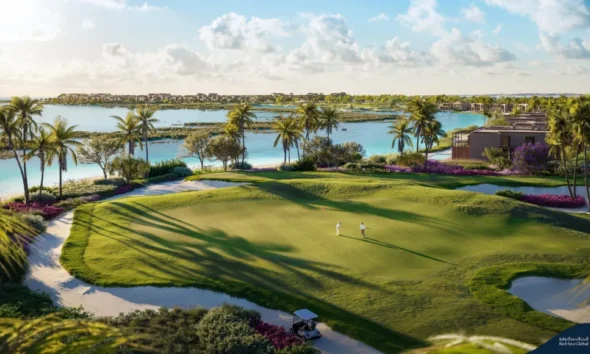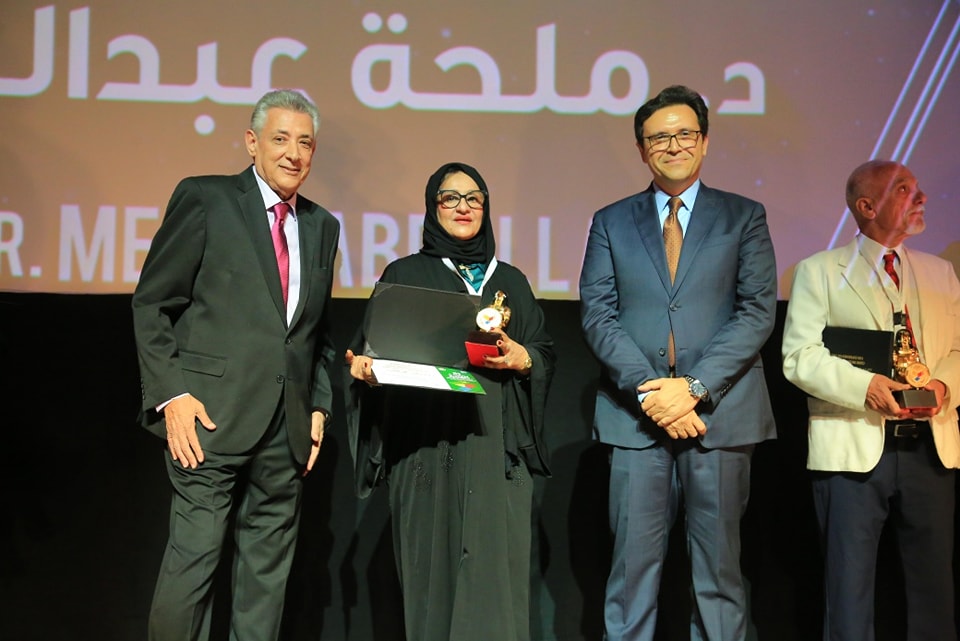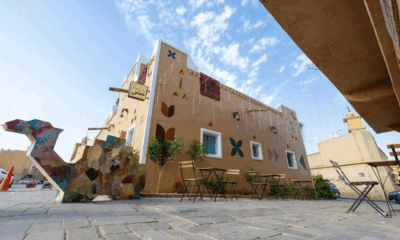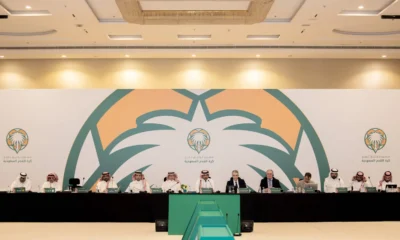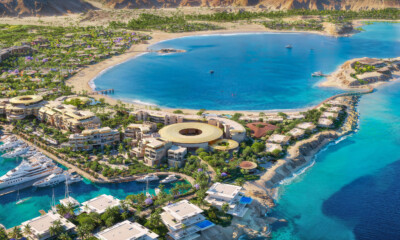Home » Saudi Arabia » Malha Abdullah, Dean of the Saudi Theatre: The Crown Prince is the Vision’s Creator and Innovator, and there are Opportunities to See a Theatre Beneath Every Rock
Interviews
Malha Abdullah, Dean of the Saudi Theatre: The Crown Prince is the Vision’s Creator and Innovator, and there are Opportunities to See a Theatre Beneath Every Rock
Published
2 weeks agoon
By
Huda Az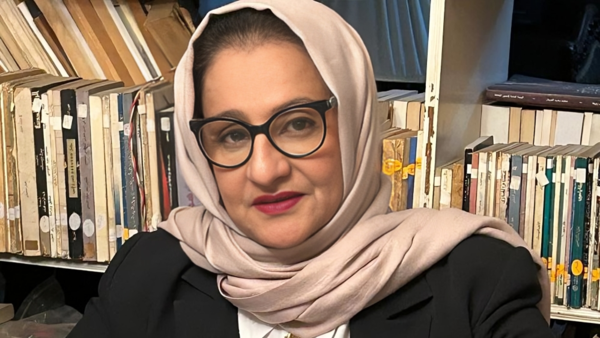
Dr. Malha Abdullah, a renowned theatre critic and researcher, is a trailblazing Saudi woman who became the first Saudi woman to specialise in theatre studies. She began her career at the first girls’ school in her hometown in the Rafidah (Al-Wadiayn) region of Qahtan, near Abha, in the Ahad Rafidah Governorate in southern Saudi Arabia.
After relocating to Cairo, she graduated from Al-Saniya School with a high school diploma. Then, she enrolled in the Egyptian Academy of Arts, where she graduated with a bachelor’s degree in drama and criticism.
Dr. Malha Abdullah is a recognised theatrical leader and contributor, graduated from Berkeley University with master’s and doctoral degrees in theatre studies. Her “Fifth Dimension” theatre theory earned her the United Nations’ first honorary doctorate in theatre studies. She has written over fifty plays, many of which have been performed live, including “The Metamorphosis,” “Umm al-Fas,” “The Labyrinth,” “The Libero,” “The Musician,” “The Secret of the Talisman,” “Spring Tavern,” and “Citizen despite Himself.”
She has written over twenty critical works, including “The Arabian Peninsula: Identity, Place, and Humanity” (2018), “The Impact of Islamic Identity on Theatre” (1998), “The Kingdom of Saudi Arabia: Customs and Traditions” (1999), and “The Impact of Bedouinism on Theatre” (1994). In addition, she is famous as the “Dean of Saudi Theatre.”
Interviewed by: Mohsen Hassan
Malha Abdullah is the recipient of multiple awards for her outstanding contribution. In 1994, the Abha Cultural Festival awarded her the Theatrical Writing Award for her play “Umm al-Fas.” In 2001, she received the Abha Cultural Award for Novels and Theatre for her combined works. She was the recipient of the 2007 Kuwaiti Generation Awareness Troupe Award for Lyrical Text.
Her play “The Musician” took first place in the UNESCO International Monodrama Competition (Arabic Version) in 2012. Her play “The Maze” took home the Northern Saudi Festival for Humour Award. The 11th Dammam Theatre Festival recognised her in 2016 for her contributions to Saudi theatre.
She was almost the only Saudi woman to receive recognition for her important contributions from Al-Azhar Al-Sharif in Egypt. She also received an honorary doctorate from the UN for her contributions to international peacekeeping and the war on terrorism. Recently, as part of the Arab Lab 2021 activities, the Iraqi Cultural House selected her as the most prominent cultural figure in the Kingdom of Saudi Arabia in 2021.
In 2023, the Taif Literary and Cultural Club published five volumes of her sixty plays, acknowledging her contributions to Saudi theatre. Saudi Crown Prince Mohammed bin Salman has tasked her with planning and coordinating the Riyadh Theatre Festival.
In an exclusive interview with Arabisk London magazine, Dr. Malha Abdullah discussed the future of Saudi theatre.
To start, how would you rate Saudi Arabia’s present level of artistic and cultural openness to the outside world, Dr. Malha Abdullah?
For thirty years, we have been anticipating the moment when the windows of awareness and light would open. Therefore, Everyone with an interest in culture, awareness, and progress was searching for knowledge and cultural sources of enlightenment while fighting against strong waves of opposition to the concept of culture itself, there were some that the entire nation did not share.
Only from specific groups were we experiencing exclusion, fragmentation, and marginalisation. This was before Vision 2030, with its dazzling light that captivated local, Arab, and international eyes, and His Highness the Crown Prince and Prime Minister Mohammed bin Salman, may God protect him, operating under the custody of the Custodian of the Two Holy Mosques, may God protect him.
Thus, I don’t so much refer to it as openness as windows of light, awareness, empowerment, and gratitude for everyone who has been given God’s creative and amazing gifts. Everyone was therefore prepared, conscious, knowledgeable, and skilled with their instruments when the vision was introduced. All levels of astonishment occurred at this point.
The Saudi National Theatre’s opening touched you deeply. Give us an account of these moments.
Yes, the opening of the Saudi National Theatre in 2019 was my greatest joy. With its modern attire and the fact that women occupied a portion of it, it marked a turning point in Saudi theatre. I sobbed as I watched the performance, and the press reported at the time that “The tears of Malha Abdullah are still in the theatre halls.”
Under the direction of King Salman, may God protect him, and the Crown Prince, who are guiding this cherished nation towards development and prosperity, the Kingdom of Saudi Arabia and its citizens, with their rich cultural and civilisational history, deserve this. The veil of light lifted by this glorious vision revealed everything brilliant and astounding. It was a global vision rather than a local or even Arab one. These lines don’t contain specifics, so since you are asking someone interested in culture and awareness, I will respond in broad strokes.
What, in your opinion, Dr. Malha Abdullah, were the implications for Saudi theatre scholars and artists of the 2020 founding of the Theatre and Performing Arts Authority?
Eleven other bodies were formed concurrently with the Theatre and Performing Arts Authority, and they are all connected to it. All of these organisations are interwoven with theatre and the performing arts.
They are all in charge of the Saudi cultural sector in all of its specialisations and directions, according to their boards of directors and composition. With their own financial and administrative autonomy, public legal personality, and organisational ties to the Ministry of Culture, the eleven organisations are all focused on advancing one or more distinct cultural sectors.
Second, it is crucial to remember that the majority of artists, academics, and those in charge of the theatrical and performing arts movement are working for their country. Subjectivity and chauvinism are absent because everyone is working like a beehive, dissolved, and interacting in the service of this vision and renaissance. We unquestionably want this renaissance and this Arab, international, and local cultural and artistic epic, which is why even those who did not find a prominent role played an extraordinary role behind the scenes.
Some people gripe about how many cities and areas in the Kingdom require updated infrastructure and construction. What are your thoughts on this complaint, Dr. Malha Abdullah?
It indicates that the complainants are not aware of what is going on in the Ministry of Culture’s cultural kitchen. As a member of the Theatre and Performing Arts Authority’s Board of Directors, I can attest that the amount of work and strategies that have been put into building the theatre and performing arts infrastructure over the past three years—from building theatres (movie theatres) and academies to sending study abroad scholarships—is unimaginable.
In addition to the facilities’ infrastructure, the work involved training and preparing leaders, students, and artists—both qualified and unqualified—to enter this broad field that aims for a worldwide standard of creativity and art.
May God keep His Highness the Crown Prince safe. This is his vision. Interest in advancing this important project is based on talent and passion. However, these complainants, who have a strong interest in theatre, are hurried, and it is difficult for the experience to surface so rapidly. But it became very clear at the Riyadh Theatre Festival, which captivated people worldwide!
Giving theatrical management to private businesses, possibly run by non-theatre professionals. Do you think the Saudi Ministry of Culture is taking a reasonable step at this time?
Theatrical management has never been a private enterprise and never will be. Alternatively, the Authority oversees, manages, and assists the private sector. This is because, following the Ministry’s and the Authority’s standards, the private sector is the main source of information for these businesses, and its involvement is crucial for partnerships.
Naturally, this is consistent with Saudi identity, culture, traditions, and norms. Any work that does not adhere to the standards and quality of the theatrical arts as specialised fields is not approved or supported by the Authority.
What do you think of the Saudi Crown Prince’s decision to remove the previous censorship of theatrical texts? As a Saudi theatre expert, what do you suggest to support theatre and its pioneers in the Kingdom going forward?
His Royal Highness the Crown Prince is the vision’s creator and innovator, so everything he sees is unquestionably significant. Moreover, creative people do not work under supervision that compels them to modify their work to suit their needs, and when you limit creativity, it suffers. It’s a step out into the open in keeping with our inherent respect for our identity, traditions, and customs.
Regarding empowering theatrical work, there are many options available, and everyone should “throw their eggs in the basket” as the Egyptian saying goes, but our recommendations receive consideration, and the board of directors carefully considers each one, making sure to cover every possibility.
As the Dean of the Saudi Theatre, how pleased is Dr. Malha Abdullah with the Riyadh Theatre Festival’s inaugural session? Do you have any reservations?
I have no reservations. The Board of Directors approved this festival in the middle of last year, and we have been working assiduously, fervently, and with all of our strength.
With the help of His Highness Mohammed bin Salman, may God protect him, who has been keeping a close eye on everything, and under the direction of His Highness the Minister and CEO, Mr. Sultan Al-Bazie, as well as all of the Authority’s employees, it has arrived in this advanced form and received praise from those who have praised it for both its content and its superb organisation.
With God Almighty’s grace, I could help this festival reach this incredible level by serving on the screening and viewing committee for five months in a row throughout the Kingdom’s cities.
Has the Ministry of Culture’s administrative hegemony over theatrical events impacted the independent theatrical endeavours of the troupes affiliated with the Culture and Arts Association?
The Commission doesn’t control things the way it wants. Instead, it functions as a management, support, encouragement, review, and selection agency. The problem is not “a free rein,” but rather that everyone is structured within the institution’s framework to ensure that the quality of the work is maintained.
The Commission endorses all quality work that is submitted to it. To be clear, the Ministry has created professional associations for every agency, and each agency has its staff and board of directors under the Ministry’s authority. In March 2021, His Excellency the Minister, His Highness Prince Badr bin Abdullah bin Farhan (may God protect him), approved the Ministry of Culture’s non-profit strategy.
There are several non-profit organisations in Saudi Arabia. This strategy includes establishing sixteen professional associations in thirteen cultural sectors to create a diverse network of non-profit organisations in a range of sectors, dispersed throughout all regions. What does the Commission’s dominance mean? Quite the opposite; it aims to bring the whole artistic and theatrical community together while offering every chance for exceptional shows.
What about these strategies’ newly formed associations for the performing arts and theatre?
On October 24, 2021, the first association pertaining to theatre and performing arts emerged. Artist Nasser Al-Qasabi heads its board of directors, which also consists of Dr. Sami Al-Jumaan, Dr. Rashid Al-Shamrani, Professor Khaled Al-Baz, Yasser Madkhali, Fahd Al-Hoshani, Ruwa Al-Sahhaf, engineer Yasser Bakr, artist Sami Al-Zahrani, Professor Fatima Al-Banawi, and Professor Samira Al-Khamis.
This association caters to professionals and practitioners in a variety of theatre-related fields as well as performing arts specialities and categories, including dance, improvisational comedy, folk arts, and circus.
Among the numerous Saudi theatre groups, which number close to one hundred, what do you find? Is there anything good or bad about this high number?
There are only a hundred theatre groups. Every neighbourhood and every stone should have a theatre, is our hope. Theatre is a window to the soul, a reflection of culture, a form of public awareness, and a mirror of every people’s history, so everyone should go out and play. In my opinion, amateurs are more significant than professionals since all theatre performers are amateurs, and passion is what inspires creativity.
Do you think the theatre experience in the Gulf has matured artistically and theatrically, and what is lacking?
If an artist declares, “I’ve attained the highest level of artistic success,” that is the end. Theatre doesn’t have a ceiling and doesn’t mature until it is reborn. It is always giving birth to new schools and visions, each with its audience.
What one person finds appealing might not be appealing to another. For instance, it is inconceivable to find Simon Fuller, a well-known English artist and producer and a member of our board of directors, griping about British theatre, the opportunities it offers, and the necessary practice. Theatre is a powerful force that is hard to subdue. Taste is subjective and can determine a situation in certain situations.
Lastly, what kind of theatre will best support the Kingdom of Saudi Arabia’s present and future theatrical aspirations?
Saudi Arabian theatre is currently in what I call the “modern theatre” phase, which embraces all schools and theatre trends and has its own audience for each piece. Nonetheless, we discover that comedic theatre draws a larger audience. If done properly, tragic theatre is still acceptable.
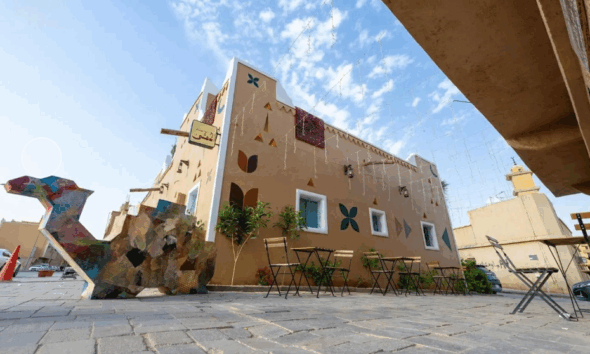
Diriyah’s Popular Cafés: Art & Creativity Collide with Genuine Heritage
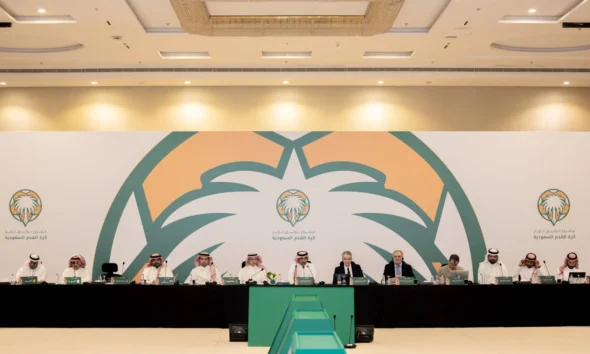
Saudi Football Documentation Project: Extensive Disputation
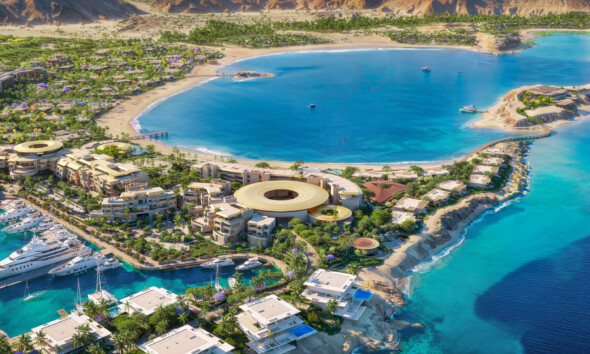
Nammos Resort AMAALA: KSA’s New Address for International Luxury Hospitality
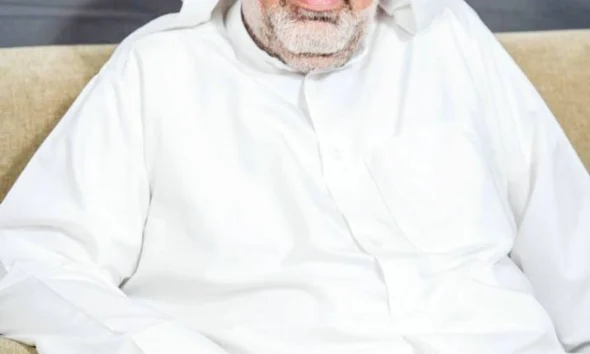
Muhammad Mahfouz: Trump will Respond to Riyadh’s Ambitions, and We Must Develop a Gulf-Arab Project with Iran
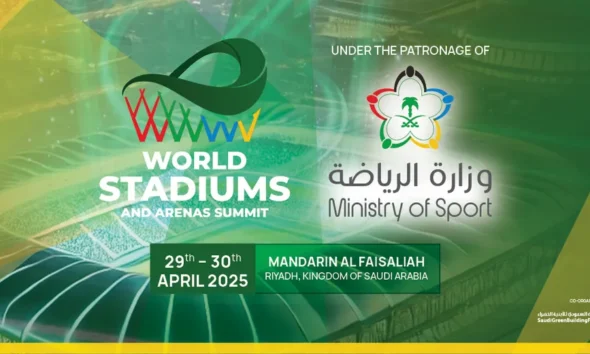
The World Stadiums & Arenas Summit 2025 has Arabisk London – Saudi Arabia as a Media Partner
